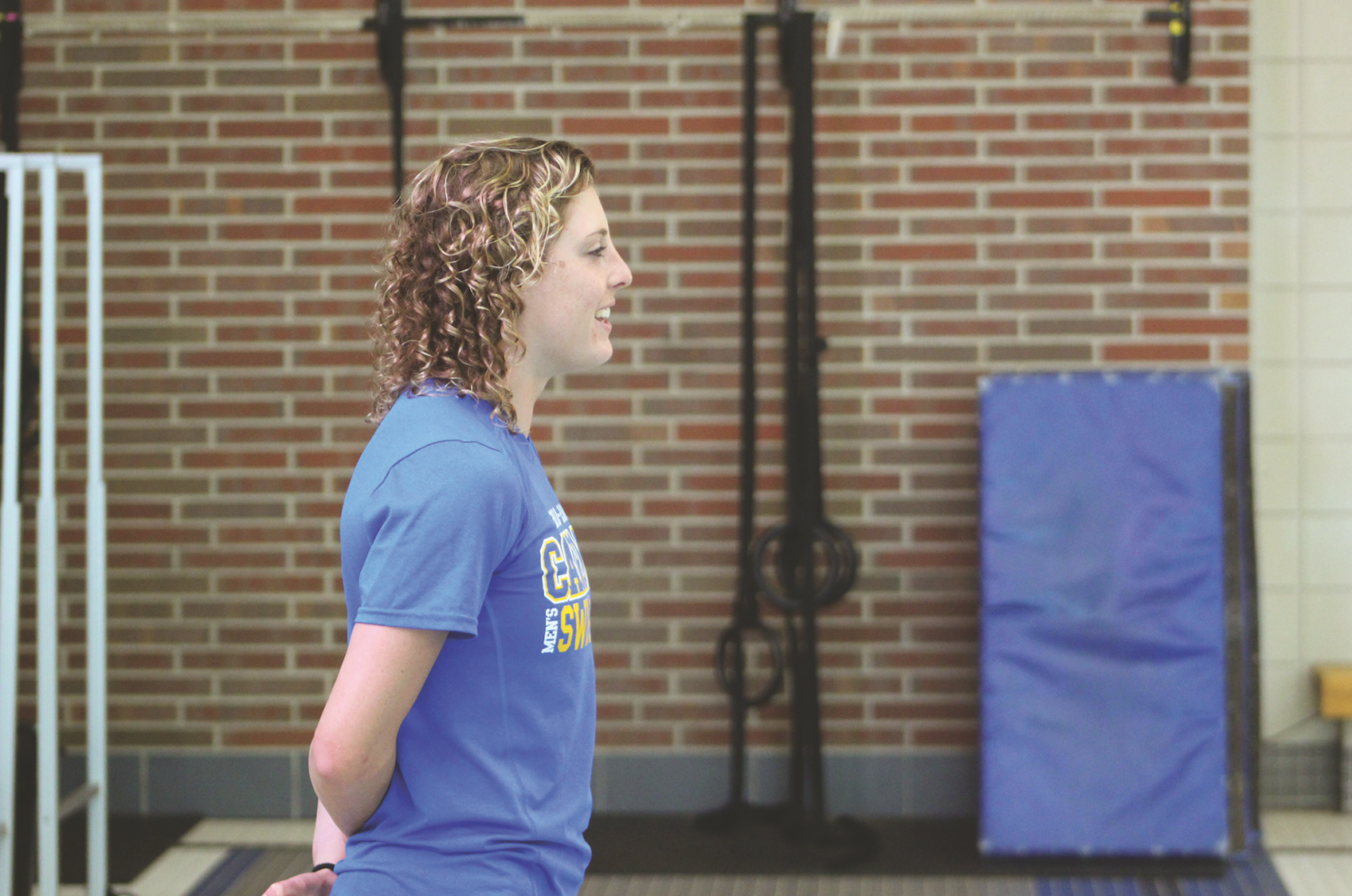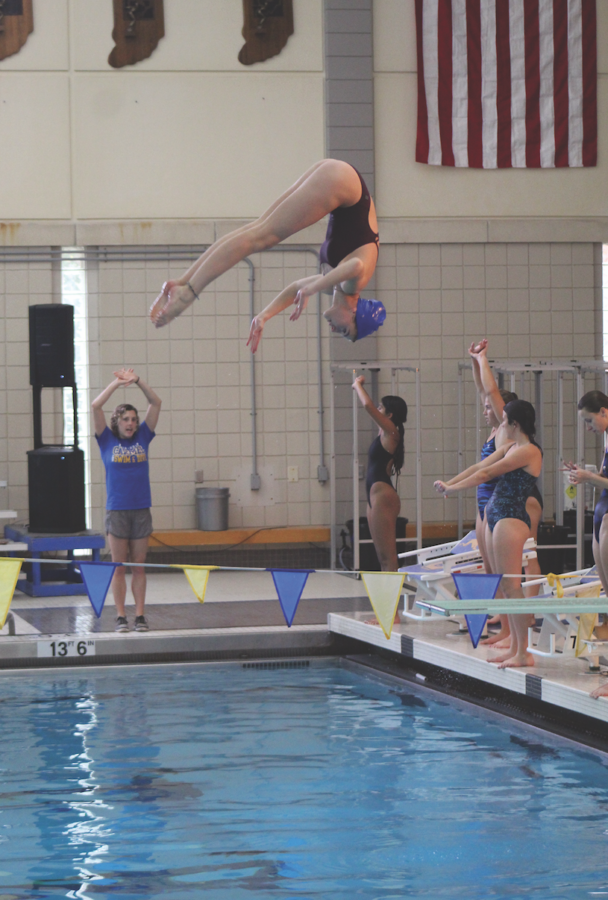Diving off the one meter boards, diver and sophomore Darci Commons works to perfect her form. For Commons, diving isn’t just flips and tricks in the air but actually requires a lot of work in the mind as well.
“Honestly, there is a lot that goes into each dive, but as long as you practice proper technique and do it the way your coaches teach you, you’ll be okay,” Commons said.
The diving team practices at least four days a week after school. While practices consist of flexibility training, actually diving and conditioning for their bodies to bend and twist in the air with only water below them.
Commons said, “My coaches always say that diving is a mental sport because anyone can do a dive, but it’s the mental determination to do a dive that scares you or makes you step outside your comfort zone that really makes the sport challenging and unique.”
Second-year diving coach Chelsea Jackson said, “The most important aspect is once you figure out what you need to do and get over the fear of doing things and also being mentally able to do your best when it’s required in diving.”

Diving coach Chelsea Jackson instructs diver and sophomore Darci Commons. Jackson said that core and leg strength are required to correctly execute a dive. Commons added that mentality is an important aspect of success for diving.
Divers have several types of dives they must learn- front, back, reverse, inward and twisters. Altogether, these dives make up what they practice and perform during a dive. The full list includes 11 dives, five voluntary dives, which are basic dives, and six optional dives, which are considered the advanced dives. All of their practice helps them prepare for their competition.
According to divers, repetition is key. Diver and sophomore Zachary “Zach” Zimmerman said his coaches help.
Zimmerman said, “ Being comfortable doing a dive is hard, but my coach is always there to help me feel comfortable and confident about the dive.”
The physical aspects of diving include core, leg and arm strength. If divers put all of these together, this will benefit the ease of the dive. So every day at practice, divers either hit the weight room or do some type of workout to hit all aspects of the strength they need.
Zimmerman added that there are aspects of diving in addition to just physical strength.
“All of the physical strength helps, but the another very important aspect is flexibility, which also plays a factor in the diving,” Zimmerman said.
Even before walking to the diving board, divers must think about what they are going to do in mid-air and what exercises and thoughts will prepare them for the upcoming dive.
Commons said, “We have to focus on each position, not just the hurdle, but in the air and as we are going into the water. We have to keep our focus which is super important. In the middle of the air, I don’t really know what goes through my mind, but again just focusing on the positioning or figuring out when to open up so I prevent smacking.”
After she hits the water, Commons said she loves to figure out how she did or what she can do better.
“Afterwards I like to correct myself before I even get out of the water, and of course my coach will help me after,” she said.
Commons said all of the divers are supportive of one another, regardless of a bad score. She described the impact the team has on mentality.
Commons said, “The most important thing about diving is having an amazing team, not just for competition but also for just being supportive and giving you encouragement,” she said.
Jackson explained the impact of support on a diver’s mentality.
Jackson said, “The support you get from your teammates at competition or even when you are learning new dives. It is so much easier for having someone there with you (when) you’re going through hard conditioning, scary dives, and (a) competition. It’s just that they are there and they understand what you are going through.”



































![AI in films like "The Brutalist" is convenient, but shouldn’t take priority [opinion]](https://hilite.org/wp-content/uploads/2025/02/catherine-cover-1200x471.jpg)










































![Review: “The Immortal Soul Salvage Yard:” A criminally underrated poetry collection [MUSE]](https://hilite.org/wp-content/uploads/2025/03/71cju6TvqmL._AC_UF10001000_QL80_.jpg)
![Review: "Dog Man" is Unapologetically Chaotic [MUSE]](https://hilite.org/wp-content/uploads/2025/03/dogman-1200x700.jpg)
![Review: "Ne Zha 2": The WeChat family reunion I didn’t know I needed [MUSE]](https://hilite.org/wp-content/uploads/2025/03/unnamed-4.png)
![Review in Print: Maripaz Villar brings a delightfully unique style to the world of WEBTOON [MUSE]](https://hilite.org/wp-content/uploads/2023/12/maripazcover-1200x960.jpg)
![Review: “The Sword of Kaigen” is a masterpiece [MUSE]](https://hilite.org/wp-content/uploads/2023/11/Screenshot-2023-11-26-201051.png)
![Review: Gateron Oil Kings, great linear switches, okay price [MUSE]](https://hilite.org/wp-content/uploads/2023/11/Screenshot-2023-11-26-200553.png)
![Review: “A Haunting in Venice” is a significant improvement from other Agatha Christie adaptations [MUSE]](https://hilite.org/wp-content/uploads/2023/11/e7ee2938a6d422669771bce6d8088521.jpg)
![Review: A Thanksgiving story from elementary school, still just as interesting [MUSE]](https://hilite.org/wp-content/uploads/2023/11/Screenshot-2023-11-26-195514-987x1200.png)
![Review: "When I Fly Towards You", cute, uplifting youth drama [MUSE]](https://hilite.org/wp-content/uploads/2023/09/When-I-Fly-Towards-You-Chinese-drama.png)
![Postcards from Muse: Hawaii Travel Diary [MUSE]](https://hilite.org/wp-content/uploads/2023/09/My-project-1-1200x1200.jpg)
![Review: "Ladybug & Cat Noir: The Movie," departure from original show [MUSE]](https://hilite.org/wp-content/uploads/2023/09/Ladybug__Cat_Noir_-_The_Movie_poster.jpg)
![Review in Print: "Hidden Love" is the cute, uplifting drama everyone needs [MUSE]](https://hilite.org/wp-content/uploads/2023/09/hiddenlovecover-e1693597208225-1030x1200.png)
![Review in Print: "Heartstopper" is the heartwarming queer romance we all need [MUSE]](https://hilite.org/wp-content/uploads/2023/08/museheartstoppercover-1200x654.png)




